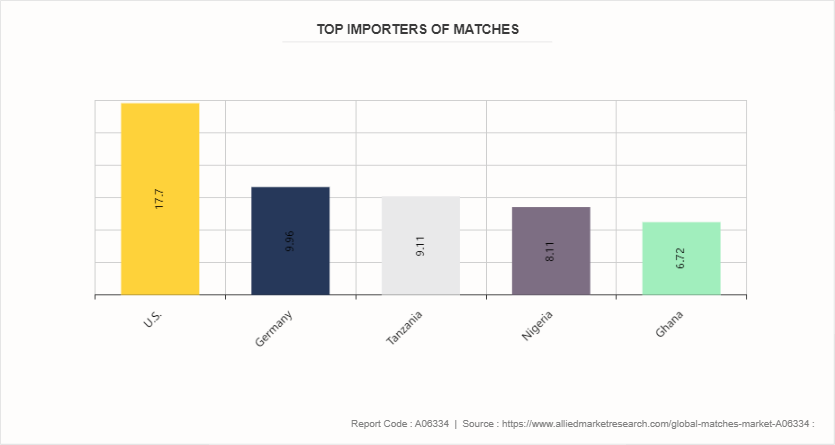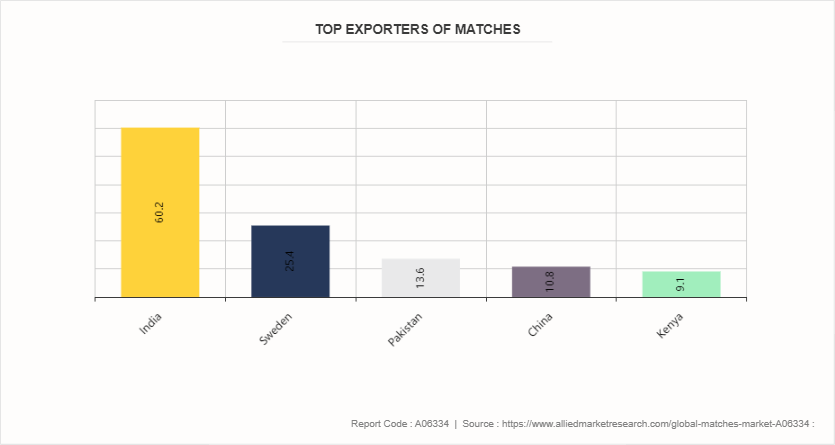Matches Market Research, 2033
The global matches market was valued at $195.8 million in 2023, and is projected to reach $233.5 million by 2033, growing at a CAGR of 1.8% from 2024 to 2033.Matches are small, lightweight sticks with a combustible tip designed to produce fire quickly and easily. Their significance lies in their role as a simple yet revolutionary tool for fire-starting, which has been crucial for human survival, development, and daily life. Matches have played a vital part in cooking, heating, lighting, and various industrial processes since their invention in the early 19th century. It represents a significant advancement over earlier fire-starting methods, offering convenience, portability, and reliability. The invention of friction matches marked a turning point in fire technology, making it accessible to the masses and contributing to improved sanitation, cooking practices, and overall quality of life. Today, while alternative fire-starting methods exist, matches remain widely used in households, outdoor activities, and emergency preparedness kits, increasing matches market demand in modern society.

Key Takeaways
The matches market study covers 20 countries. The research includes a segment analysis of each country in terms of value ($Million) for the projected period 2024-2034.
More than 1, 500 product literatures, industry releases, annual reports, and other such documents of major matches industry participants along with authentic industry journals, trade associations' releases, and government websites have been reviewed for generating high-value industry insights.
The study integrated high-quality data, professional opinions and analysis, and critical independent perspectives. The research approach is intended to provide a balanced view of global markets and to assist stakeholders in making educated decisions in order to achieve their most ambitious growth objectives.
Key Market Dynamics
Matches hold significant importance in various religious and cultural practices around the world, contributing to a steady demand in the market. In many cultures, matches are essential for lighting candles, incense sticks, and ceremonial fires, which are integral to rituals and celebrations. For instance, in Hinduism, lighting oil lamps with matches is a common practice during festivals like Diwali. Similarly, in Buddhism, matches are used to light incense sticks in temples as offerings. These traditional practices ensure a continuous matches market growth, despite advancements in technology. In addition, matches are often preferred over lighters in these contexts owing to their symbolic value and ease of use. This sustained demand driven by cultural and religious practices plays a crucial role in maintaining the market for matches, ensuring that they remain a staple household item in many regions.
However, the perception of matches as outdated technology in some markets significantly restrains their demand. With the invention of modern ignition devices like electric lighters and gas stoves with built-in ignition, the reliance on traditional matches has decreased. Consumers in developed regions often view matches as less convenient and less safe compared to contemporary alternatives. The environmental impact of match production and usage, including deforestation and chemical waste, also contributes to their declining popularity. Furthermore, the increasing preference for more sustainable and reusable options further diminishes the appeal of matches. As technology advances and more efficient ignition methods become accessible, the perception of matches as a relic of the past continues to grow, leading to a gradual decline in their market demand, particularly in urbanized and technologically advanced areas.
Moreover, the expansion into emerging markets with low electrification rates presents significant opportunities for the matches market share. In many developing regions, particularly in Africa and parts of Asia, access to reliable electricity remains limited, making matches an essential tool for daily activities such as lighting stoves, lamps, and candles. These regions rely heavily on traditional methods for cooking and lighting, where matches play a crucial role. In addition, the lower cost of matches compared to modern ignition devices makes them an affordable option for low-income households. As efforts to expand electrification continue, the demand for matches in these areas is expected to remain strong. Companies can capitalize on this by increasing their distribution networks and marketing efforts in these emerging markets, thereby tapping into a substantial and growing customer base with increasing matches market size.
Top Import-Export Countries in 2022
The latest trade data of Matches by OECD In 2022 shows that matches were the world's 3710th most traded product, with a total trade of $202M. Between 2021 and 2022 the exports of Matches decreased by -2.5%, from $207M to $202M. Trade in Matches represents 0.00085% of total world trade.
Top Importers: In 2022 the top importers of Matches were United States ($17.7M) , Germany ($9.96M) , Tanzania ($9.11M) , Nigeria ($8.11M) , and Ghana ($6.72M) .

Top Exporters: In 2022 the top exporters of Matches were India ($60.2M) , Sweden ($25.4M) , Pakistan ($13.6M) , China ($10.8M) , and Kenya ($9.1M) .

Benefits of Matches over Lighters
Matchboxes offer several benefits over lighters. They are environmentally friendly and often made from biodegradable materials, unlike plastic lighters, which contribute to landfill waste. Matches are also safer to use; they extinguish naturally, reducing the risk of accidental fires.
Match box manufacturers are cost-effective, easily accessible, and require no maintenance or refueling. They perform reliably in various conditions, including at higher altitudes where lighters may fail. In addition, matches provide a tactile and nostalgic experience that many users find appealing.
Matchboxes can be customized and used as an effective marketing tool for promotional purposes. Their simplicity, reliability, and lower environmental impact make matchboxes a preferred choice for many consumers.
Market Segmentation
The matches market is segmented into type, packaging, distribution channel and region. On the basis of type, the market is divided into ordinary matches, high-grade matches and others. As per packaging, the market is segregated match box and march book. On the basis of distribution channel, the market is divided into supermarkets & hypermarkets, convenience stores, specialist retailers, online and others. Region wise, the market is analyzed across North America, Europe, Asia-Pacific, and LAMEA.
Regional/Country Market Outlook
Asia-Pacific holds the maximum share in the matches industry owing to several factors, including a large population base and the prevalence of traditional cooking and lighting practices. Countries like India and China, with their vast rural populations, continue to drive the demand for matches. In India, for instance, according to matches market forecast millions of households still rely on matches for lighting stoves and lamps, contributing to steady market demand. In terms of population, 44.7% of rural population does not have access to electricity, while the figure for urban areas is 7.3%, highlighting the reliance on matches in these areas. Similarly, in China, traditional practices and the significant rural population ensure a consistent demand for matches. The Asia-Pacific region's cultural practices, large population, and varying levels of electrification make it the dominant player in the global matches market.
Industry Trends:
The matches market has been experiencing several notable industry trends:
Shift towards eco-friendly production: There's a growing focus on sustainable manufacturing processes and materials, including the use of recycled or biodegradable components.
Safety innovations: Manufacturers are developing safer match designs, such as strike-anywhere matches with reduced toxicity and improved fire resistance.
Niche market growth: Specialty matches for specific purposes (e.g., long-burning matches for fireplaces, waterproof matches for outdoor activities) are gaining popularity.
Packaging innovations: Companies are experimenting with more convenient and attractive packaging designs to appeal to modern consumers.
Digital competition: The rise of electronic lighters and other fire-starting devices is challenging traditional match markets, especially in developed countries.
Emerging market expansion: Match manufacturers are focusing on growth opportunities in developing countries where traditional fire-starting methods are still prevalent.
Artisanal and luxury matches: There's a small but growing market for premium, aesthetically pleasing matches aimed at design-conscious consumers and gift-givers.
Competitive Landscape
The major players operating in the matches market include Atlas, Malazlar, Dhanalakshmi Match, Chugai Match, Europe Match, Anyang, Sustech, Swarna Match Factory, ITC, Swedish Match and Kanematsu.
Key Sources Referred
OEC Wrld
Down to Earth
Fashion Network
The Dollor Business
RT Retail
Enterprenure India
Trade Development Authority of Pakistan
Scribd
Quenker
Economic Times
Key Benefits For Stakeholders
This report provides a quantitative analysis of the market segments, current trends, estimations, and dynamics of the matches market analysis from 2024 to 2033 to identify the prevailing matches market opportunities.
The market research is offered along with information related to key drivers, restraints, and opportunities.
Porter's five forces analysis highlights the potency of buyers and suppliers to enable stakeholders make profit-oriented business decisions and strengthen their supplier-buyer network.
In-depth analysis of the matches market segmentation assists to determine the prevailing market opportunities.
Major countries in each region are mapped according to their revenue contribution to the global market.
Market player positioning facilitates benchmarking and provides a clear understanding of the present position of the market players.
The report includes the analysis of the regional as well as global matches market trends, key players, market segments, application areas, and market growth strategies.
Matches Market Report Highlights
| Aspects | Details |
| Market Size By 2033 | USD 233.5 Million |
| Growth Rate | CAGR of 1.8% |
| Forecast period | 2024 - 2033 |
| Report Pages | 195 |
| By Type |
|
| By Packaging |
|
| By Distribution Channel |
|
| By Region |
|
| Key Market Players | Swedish Match, Dhanalakshmi Match, Anyang, Europe Match, Swarna Match Factory, Chugai Match, Sustech, Malazlar, Kanematsu, Atlas |
Emerging trends in the global matches market include a shift towards eco-friendly and sustainable match production, using materials like recycled paper and non-toxic chemicals. There's also growing demand for specialty matches with unique designs or scents for niche markets, as well as increased focus on safety features and child-resistant packaging.
The leading application of the matches market is household use for lighting candles, fireplaces, and starting small fires for cooking or camping. Matches are also widely used in the hospitality industry, particularly in restaurants and bars, for lighting candles and cigarettes.
The Asia-Pacific is the largest regional market for Matches
The global matches market was valued at $195.8 million in 2023, and is projected to reach $233.5 million by 2033, growing at a CAGR of 1.8% from 2024 to 2033.
The Atlas, Malazlar, Dhanalakshmi Match, Chugai Match, Europe Match, are the top companies to hold the market share in Matches.
Loading Table Of Content...



